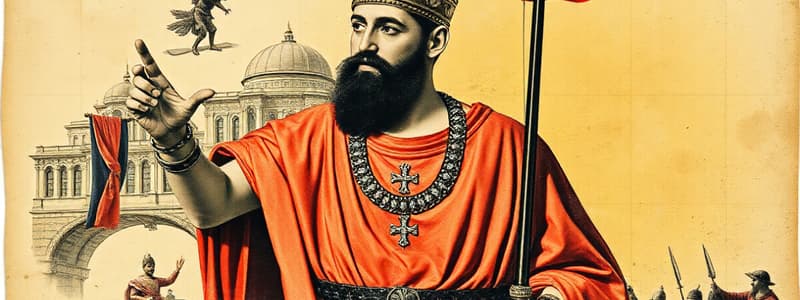Podcast
Questions and Answers
Who was Emperor Justinian?
Who was Emperor Justinian?
He was the most important ruler in Byzantine and he helped restore some of Rome's former glory.
What were some of Emperor Justinian's greatest accomplishments?
What were some of Emperor Justinian's greatest accomplishments?
Drecoquest, laws - changed them to make them more efficient, the buildings he organized/built, and secret agents that were undercover as monks who discovered how the Chinese were able to make silk.
What does 'Dominus et Deus' mean?
What does 'Dominus et Deus' mean?
It means lord and god.
Who referred to himself as Dominus et Deus?
Who referred to himself as Dominus et Deus?
Who was Procopius?
Who was Procopius?
What did Procopius' 'Secret History' reveal?
What did Procopius' 'Secret History' reveal?
What was the Hagia Sophia?
What was the Hagia Sophia?
Where was the Hagia Sophia built?
Where was the Hagia Sophia built?
What was 'Greek fire'?
What was 'Greek fire'?
What did 'Greek fire' prove?
What did 'Greek fire' prove?
What does 'Agentes in Rebus' mean?
What does 'Agentes in Rebus' mean?
What were Iconoclasts?
What were Iconoclasts?
What did the Byzantines think about Iconoclasm?
What did the Byzantines think about Iconoclasm?
What was the Great Schism of 1054?
What was the Great Schism of 1054?
What did the Pope do in the Great Schism of 1054?
What did the Pope do in the Great Schism of 1054?
Who was Charlemagne?
Who was Charlemagne?
Who were Charlemagne's rivals?
Who were Charlemagne's rivals?
What were Capitularies?
What were Capitularies?
What is Carolingian miniature?
What is Carolingian miniature?
What is Einhard's 'Life of Charlemagne'?
What is Einhard's 'Life of Charlemagne'?
What did the Lateran Palace Mosaic show?
What did the Lateran Palace Mosaic show?
What is Comitatus?
What is Comitatus?
What was the chief supposed to distribute to the Comitatus?
What was the chief supposed to distribute to the Comitatus?
Can the chief go to war without discussing it with the Comitatus?
Can the chief go to war without discussing it with the Comitatus?
Study Notes
Emperor Justinian
- Was the most important ruler in the Byzantine Empire
- Helped restore some of Rome’s former glory
- Implemented legal reforms (Derecoquest) to make the system more efficient
- Built impressive buildings
- Used undercover secret agents, disguised as monks, to discover how the Chinese made silk
Dominus et Deus
- Means “Lord and God”
- Phrase adopted by Emperor Justinian
- Demonstrates the centralisation of power through him, claiming all power derives from God
Procopius
- Byzantine historian
- Wrote “Secret History”
“Secret History”
- Reveals the brutality of the Byzantine autocratic system
- Emphasizes the Emperor's rule by Divine Providence
Hagia Sophia
- Holy Church of Wisdom
- Built under the reign of Justinian in Constantinople (now Istanbul)
- Constructed with allusions that look as if Jesus is floating above
“Greek Fire”
- Byzantine weapon used primarily at sea against enemy ships
- Demonstrates the Byzantine Empire’s technological advancement
Agentes In Rebus
- Translates to “People doing things”
- Justinian’s spy network
- Disguised as monks, they discovered the secret of Chinese silk production
Iconoclasm
- Disputes within Christianity regarding the use of icons
- Iconoclasts, who opposed icons, argued that they violated the 10 Commandments
The Byzantine Church’s View on Iconoclasm
- Byzantines did not support Iconoclasm
- Believed in the use of icons
Great Schism of 1054
- The separation of the Roman Catholic Church and the Eastern Orthodox Church (Byzantine Church)
Pope’s Role in the Great Schism of 1054
- Pope excommunicated the five patriarchs of the Byzantine Church
Charlemagne
- King of the Franks
- Considered an ideal king
- Known as the founder of the first empire in Western Europe after the fall of Rome
- Rivaled with the Pope
- Issued Capitularies on Law to uphold Christianity above all other religions
Carolingian Minuscule
- New form of handwriting created by Charlemagne
- Standardized handwriting and ensured the preservation and transmission of knowledge
Einhard’s “Life of Charlemagne”
- Book about the life and reign of Charlemagne
- Written by one of his dedicated servants
Lateran Palace Mosaic
- Commissioned by the Pope to celebrate Charlemagne’s coronation as Holy Roman Emperor
- Shows that the power of the Pope derives from God, placing the Church above the Holy Roman Emperor
Comitatus
- Germanic war band that follows their leader
- The leader depended on their fidelity
Chief’s Duties to the Comitatus
- The chief was responsible for distributing the spoils of war to his followers
- Members of the Comitatus were rewarded for engaging in violence and warfare
Studying That Suits You
Use AI to generate personalized quizzes and flashcards to suit your learning preferences.
Related Documents
Description
Explore the significant aspects of Emperor Justinian's reign, including his legal reforms, the construction of Hagia Sophia, and his use of secret agents. Discover his centralization of power and insights from Procopius's 'Secret History' that highlight the Byzantine autocracy. Test your knowledge about this pivotal era in history.




